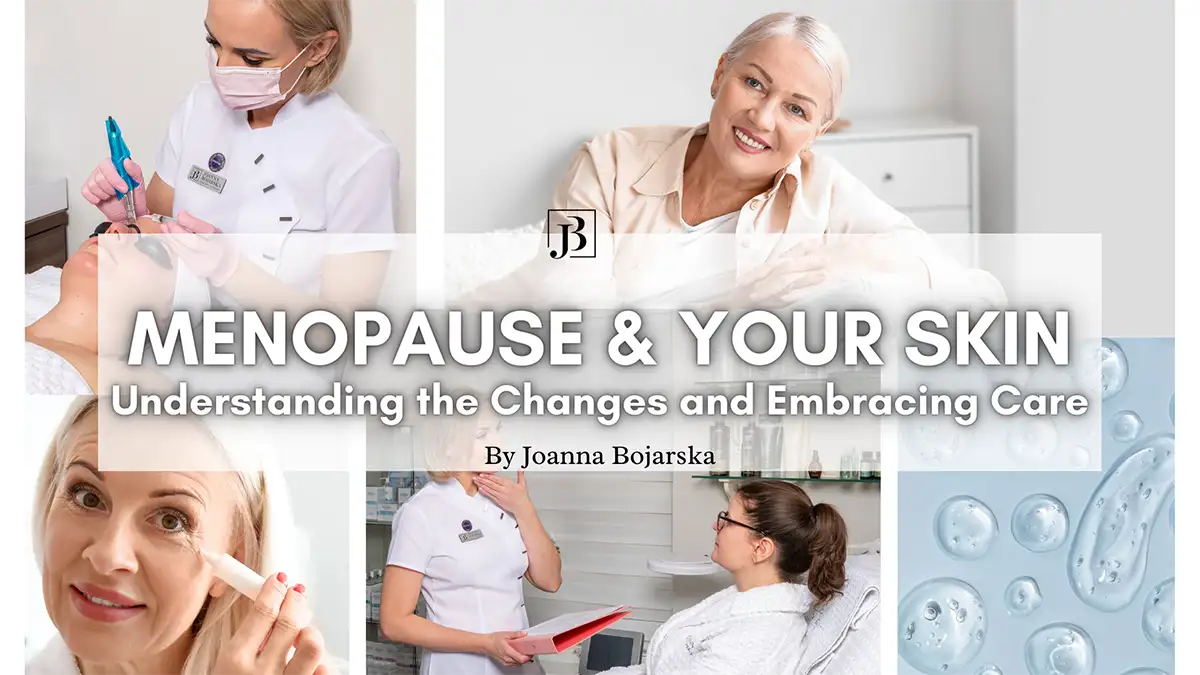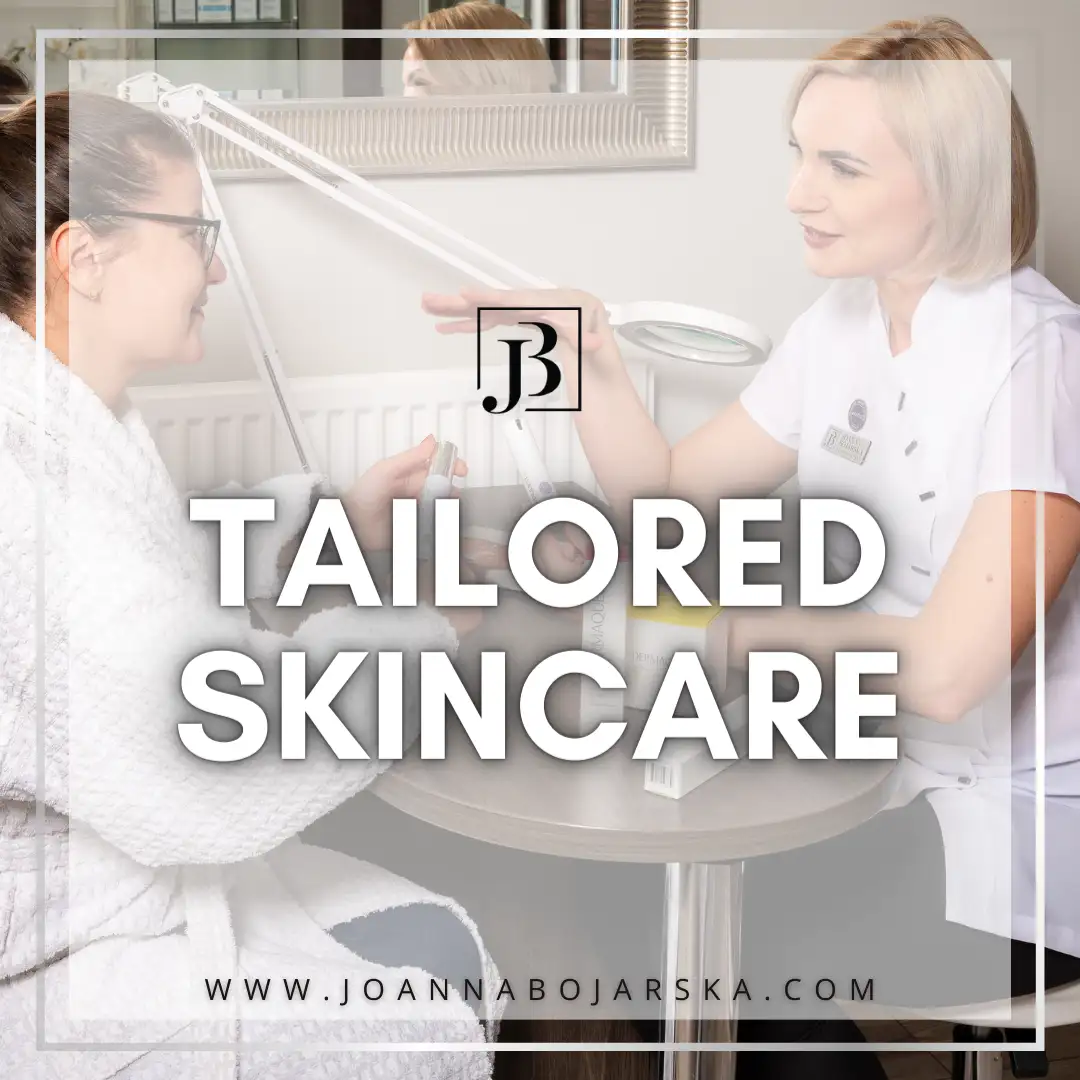Menopause and Your Skin: Understanding the Changes and Embracing Care

Blog
26th April 2024
Joanna Bojarska
I am a professional beauty therapist and non-invasive aesthetic practitioner with an advanced knowledge of the beauty industry.
Menopause marks a significant transition in a woman’s life, affecting not only her hormonal balance and physical health but also her skin.
If you’re approaching or already in the menopause stage, you might have noticed it’s not just an internal shift. Our skin, too, goes through quite the transformation. So, in today’s post, let’s get a clearer picture of what’s happening to our skin and how we can care for it during this pivotal time.
WHAT IS PERIMENOPAUSE?
Perimenopause is the precursor to menopause, typically starting in women aged 40 to 44,( though it can begin as early as the 30s(according to insights from the Mount Sinai Health Library in New York)
During this phase, women may start to notice the first signs of hormonal changes, which can include:
- Decreased progesterone levels: This change can disrupt the menstrual cycle and affect overall skin health.
- Hot flashes and skin redness: These are among the most common symptoms, often accompanied by increased skin dryness.
- Skin sagging and signs of aging: As progesterone levels drop, the skin may lose its firmness, leading to fine lines, wrinkles, and a more pronounced effect of gravity.
KEY CHANGES IN SKIN DURING MENOPAUSE

- Decreased Fibroblast Activity: Fibroblasts play a crucial role in maintaining skin structure by synthesizing the extracellular matrix. Their reduced activity during menopause leads to diminished support for the skin, affecting its ability to heal and maintain a youthful appearance.
- Lower Hyaluronic Acid Levels: Hyaluronic acid is vital for retaining skin moisture. A decrease in its levels during menopause makes the skin appear and feel drier.
- Reduction in Collagen Fibers: Collagen is essential for skin elasticity and volume. With less collagen, the skin becomes less plumped and more prone to wrinkles.
- Decreased Elasticity: As the skin’s elasticity fibers diminish, the skin becomes thicker and less flexible, making wrinkles more visible.
- Microcirculation Disorders: These can cause the skin to look dull and tired, further aging the appearance.
- Androgenization: This process can lead to increased facial hair growth on the chin and upper lip, while hair might thin on the scalp, as well as in the underarm and bikini areas
MANAGING SKIN HEALTH DURING MENOPAUSE

Understanding these changes is the first step toward managing them effectively. Here are a few tips for maintaining skin health during menopause:
- Diet – Food That Loves You Back
Power of Phytoestrogens: Incorporating foods with phytoestrogens, like soy products, flaxseeds, and sesame seeds, can be a game-changer. These plant-based nutrients mimic estrogen and help manage some of the skin challenges we face during menopause by keeping our skin more supple and less prone to dryness. - Supplements – Your Way to Better Skin
• Vitamin D and Calcium: Essential for bone health, especially as hormone levels fluctuate.
• Folic Acid: Important for maintaining a healthy heart.
• Omega-3 Fatty Acids: Key for skin hydration and overall inflammation reduction.
• B Vitamins: Boost energy and brain function.
• Vitamin A: Supports skin renewal and vision.
• Primrose Oil: Often recommended for reducing hot flashes and improving skin moisture.
• Collagen and Hyaluronic Acid: Help improve skin texture and elasticity, which can decline during menopause. - The Importance of Being Active
Regular exercise isn’t just great for your figure—it also enhances your skin’s appearance by boosting circulation and helping you feel more vibrant and energetic. Whether it’s yoga, walking, or cycling, find an activity that you enjoy and stick with it. - Tailored Skincare for Menopause
ADAPTING YOUR SKINCARE ROUTINE

- Hydrate Generously: Look for moisturizers rich in hyaluronic acid.
- Strengthen Your Skin Barrier: Ceramides and fatty acids can help protect your skin.
- Encourage Collagen Production: Products containing retinol or vitamin C are fantastic for keeping the skin firm.
- Regulate Skin Texture: Niacinamide can help manage oiliness and improve skin texture.
- Protect Against the Sun: A robust SPF can shield your skin from harmful UV rays, which are even more damaging during menopause.
PROFESSIONAL TREATMENTS TO CONSIDER

- Radiofrequency and HIFU: These can firm up the skin by stimulating deep collagen production.
- Fractional Mesotherapy: Directly feeds your skin with vitamins and antioxidants.
- Exfoliating Treatments: Chemical peels or gentle resurfacing can help reveal fresher, smoother skin.
- Facial Massages: Techniques like Kobido massage not only relax but also invigorate skin health by boosting blood flow.
Professional Facial Treatments perfect for the menopausal skin available at Beauty by Joanna Bojarska Studio;

Navigating menopause can be complex, but understanding how it affects your skin and knowing how to adjust your care routine can make a big difference. Remember, this is a natural part of aging, and with the right approach, you can maintain healthy, glowing skin. Let’s embrace this stage of life with confidence and care and if you need any further advice on this subject please contact me directly and we can schedule in your skincare consultation either online or at my beauty studio.